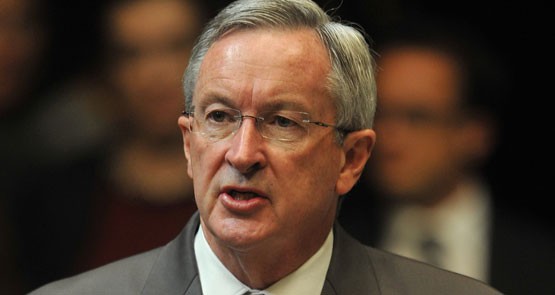
Brad Hazzard
Since NSW Parliament’s 2016 session opened one week ago, “the Bearpit” has lived up to its notorious reputation. At three consecutive question times, personal abuse was hurled across the chamber with wild abandon.
Every Labor question targeted the actions of cabinet minister Brad Hazzard in his former role as attorney-general.
The orchestrated attack centred on Hazzard’s decision in 2014 to call the counsel assisting an Independent Commission Against Corruption inquiry, Michael Fordham SC, and give him the name and contact number of a potential witness.
In later revelations it became clear Hazzard also spoke to both ICAC Commissioner Megan Latham and the subject of the watchdog’s investigation, deputy Crown prosecutor Margaret Cunneen SC.
It left an impression of political interference with ICAC’s tightly guarded independence.
Hazzard’s intervention was also explosive for another reason: it came on the eve of ICAC’s Operation Hale, a public inquiry into allegations Cunneen had tried to pervert the course of justice. The hearings were subsequently halted by the High Court of Australia, and the director of public prosecutions cleared her of prosecution.
Under Labor’s blowtorch interrogation, Hazzard admitted making calls to the ICAC and said he would do it all over again.
He ridiculed the opposition’s indignation, saying: “As attorney-general, if I make a sensible and balanced decision — which I did as attorney-general — you guys can whistle into the wind for a long while and you will get nowhere.”
Tempers began to fray during the next day’s question time when Opposition Leader Luke Foley asked Hazzard whether he had told the ICAC’s counsel assisting during their phone conversation: “Do you know what you are doing?”
In reply, Hazzard said he could not recall what he said before adding: “The Leader of the Opposition is a very immature and inexperienced leader and he needs to grow up.”
Premier Mike Baird supported his embattled colleague, warning the opposition: “If they are going to attack an outstanding minister who is doing more in Family and Community Services than any of them could ever dream of, they had better be thinking about their strategy.”
He dismissed the anti-Hazzard campaign, saying the opposition was “not fit for government” and adding: “The opposition can get on with whatever smear campaign it wants.”
By now the battle lines of the contest had become clear: Baird’s government was giving unqualified backing to Hazzard while the opposition sensed they had a ministerial scalp.
Minutes before last Thursday’s third consecutive question time, House Leader Anthony Roberts delivered a ministerial statement warning MPs:
“In light of the line of questioning that has been pursued by some members of the opposition in question time in the past two days, I take this opportunity to remind everyone of the responsibilities members have to protect confidential information in undertaking their duties as parliamentarians.
“Members who ask questions in this House should consider carefully their ethical and legal obligations to protect confidential information.
“Members must, at all times, abide by the law, and not infringe upon the privileges of Parliament or its proper functioning.”
It was like hearing a headmaster lecture a school assembly with the aim of bringing naughty pupils into line. The serious purpose, however, was to shame the opposition into stopping its attack on Hazzard’s unprecedented blindsiding of ICAC.
Former opposition leaders like Neville Wran, Barry Unsworth, Bob Carr, Nathan Rees or John Robertson would have rejected this clumsy gag attempt with contempt. Foley’s response was to call on Hazzard to join him at a joint press conference and face reporters’ questions, a request that was doomed from the start.
Still full of bluster, Hazzard lectured Labor MPs that “their leader is certainly displaying superficial, trivial, immature and shallow political judgement”.
But under repeated questions from shadow attorney-general Lynch, Hazzard snapped: “Anybody who has been here as long as I have well knows that the Member for Liverpool [Lynch] is known as … a nasty little human being.”
Then he turned on Foley accusing him of turning Parliament into “a coward’s castle” where he could make personal attacks under parliamentary privilege.
“For him to come in here and attack me is ludicrous,” fumed Hazzard. “I made sure that ICAC and the other person [Margaret Cunneen] was apprised of the fact that there was a witness. What I did as attorney-general was entirely proper.”
When Parliament resumes today the press gallery will be watching to see whether Foley’s opposition pursues Hazzard or drops off.
If its attack is not renewed, questions will be asked about the opposition’s parliamentary tactics and its political judgement.
On the other hand, if Hazzard is forced into further damning admissions his bizarre phone calls around ICAC’s controversial Cunneen inquiry will raise questions about his political judgement.
The Cunneen affair, which is absorbing Sydney’s political, legal and media classes, just keeps giving.








I see that everything positive which could possibly be said about this article has been dealt with before I arrived at this site.
Could it be that the intellectual standards of your subscribers is increasing?